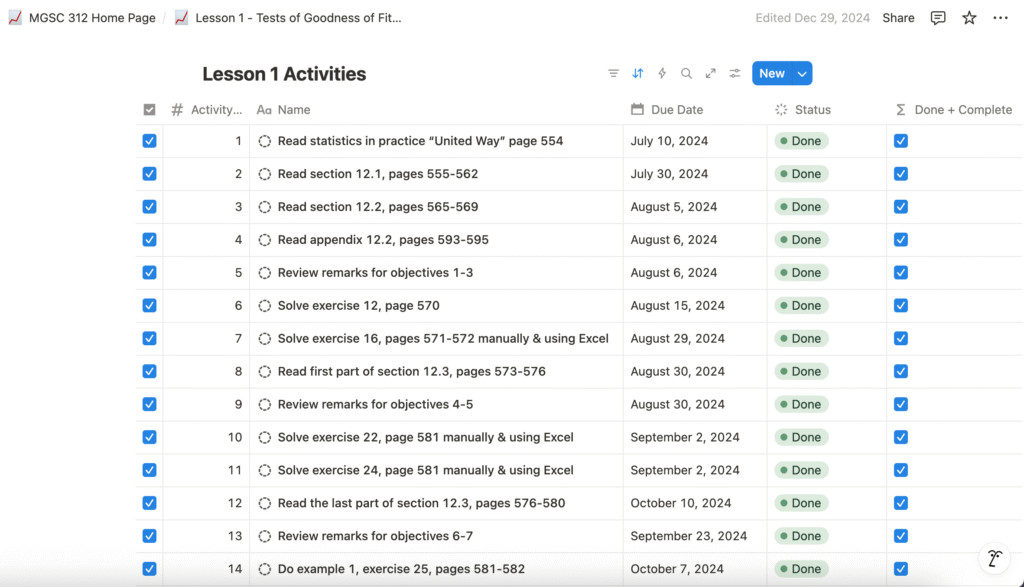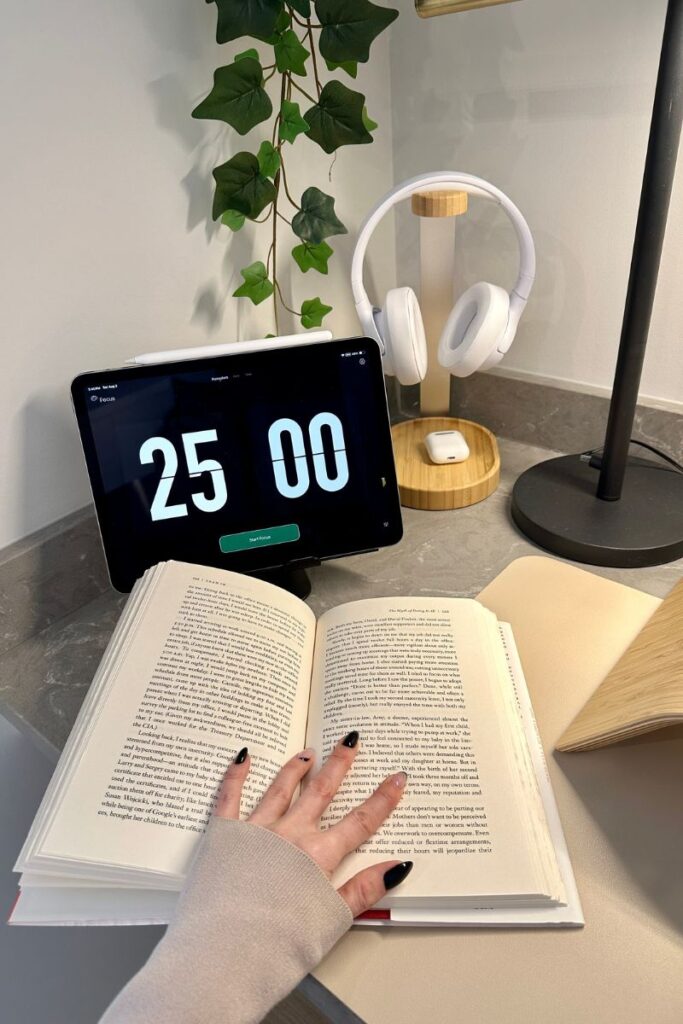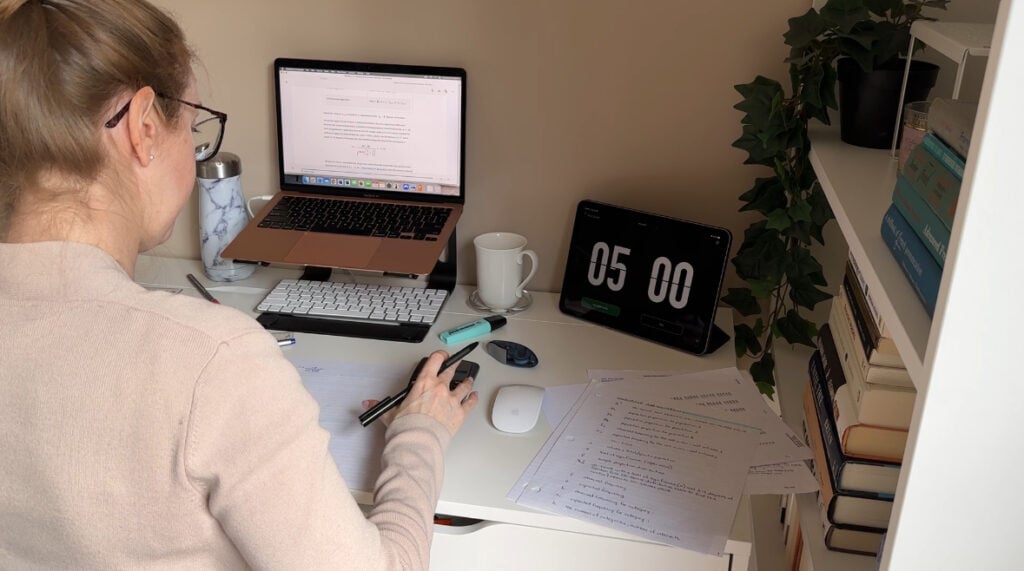Last Updated on January 17, 2026 by Alexandra Markin, Dip.Mgmt.St.
As an online Business Diploma graduate now pursuing my Bachelor of Commerce degree fully online, I’m sharing my online top online student tips that show success takes more than just logging in.
I know firsthand that the advantages of online learning make it sound like a dream: you can study from anywhere, set your own schedule and never have to pay the outrageous parking fees on campus.
But once you’re actually in, it’s a bit of a different story. True, it’s one of the biggest blessings – but it can also be one of the biggest challenges.
A study published by The National Library of Medicine (2022) found that the dropout rate for online students typically ranges from 40% to 80%. As an advocate for online higher education, I want to help change that.
It’s easy to feel isolated, unmotivated and overwhelmed when you’re juggling assignments, deadlines, and life – with no one to keep you accountable week after week.
It took me a while to figure out what actually helped me succeed. Not just in getting good grades, but in enjoying the process and feeling proud of the way I’m showing up for myself.
So if your struggling or just want to start strong as an online student, I’ve put together my top tips for online success.
Start Off Right: Build a Solid Foundation
There are a few things you can do before starting a course that will lay the groundwork for your success. No matter what your age or stage of life, there’s a lot to learn about online learning, both in the virtual classroom and how school works today. Things are always changing, so you need to be open to embracing new ways of doing things.
“When you fail to plan, you plan to fail.”
1. Attend All Online Orientations
If your school offers an online orientation, attend it. It covers so much about your school and where to get help when you need it.
This will save you a lot of time, rather than always having to email student services.
There are also orientations or “welcome” modules inside your online learning platforms, such as Moodle, Blackboard and Brightspace.
If you’re new to these platforms, be sure to complete their orientation. Even if you’ve taken a course in the past and think you know how to navigate the interface, I’ve learned shortcuts and tips that helped speed up my study time.
RECOMMENDED READ:
2. Read All Posted Course and School Information
No matter where you’re enrolled, online colleges and universities have a ton of posted information in regards to policies, student services and course specific guidelines.
One of the biggest mistakes I see online students make is NOT reading the information your college has posted to set you up for success.
Read all the information first before emailing to ask a question, because usually the answer is already there for you. I get so frustrated when I read posts in my school’s unofficial Facebook group where students are asking “How long does it take to get an assignment back?” The answer for this is ALWAYS covered in your course syllabus.
However, I totally understand that not all posted information is intuitive, and the amount to read through can feel overwhelming. If you don’t understand something in a policy, don’t assume what it means – contact student services to get clarification.
It’s just as important to review this material throughout each course as well as your entire online journey.
3. Make Enough time to Study
Online learning isn’t “easier” than traditional in-person classes. In fact, it can be a bit more difficult to get in the swing of things since you’re teaching yourself the material, most of which is in text format.
I find a lot of new online students glaze over the fact that you need to learn the material before you study. You would be in a class for at least 2.5 hours per week “learning” new material, so you need to allow time for that, plus time to study, complete assignments and practice questions and review for exams.
How Much Time Do I Need to Study for an Online Course?
As a very general recommendation, I have found that on average, it takes me 10 hours PER COURSE of study time per week, including:
- Setting up a detailed study plan per module
- Learning the material, including taking notes and searching out additional resources (YouTube, Google, etc.)
- Doing suggested practice questions
- Completing assignments and projects
- Participating in online discussions (if required)
- Getting help from professors via email and phone
- Studying for exams
This works out to approximately 1.5 hours per day, PER COURSE.
However, this can be very different for courses that you find easier or harder. I had to put in many more hours in when I was taking my required statistics course than when I was taking data management.
Some students are slower studiers and that’s totally ok. And if you’re trying for high grades, you’ll need to put in more time as well.
You’ll also need to allow enough time when asking for help. It takes me about half an hour to send ONE question to my professor by the time I open the question portal, enter all the required information, compose my question clearly and attached any photos of my material in question.
4. Make a Study Plan
Each course module (also called a lesson) will have a learning activity outline that will guide you through the material.
I create a detailed study plan so I don’t miss any learning activities. I break everything down into micro tasks so it makes it possible to be able to check off a task each study session, which is really helpful for motivation.

I like to use Notion to plan and track my learning activities, but you can use a digital or paper planner if that makes more sense for you.
5. Create a Study Routine
Different than a study plan, a study routine means carving out a schedule each week with set days and times to study. The beauty of online learning means you have complete freedom to set whatever schedule works for your life.
For example, I work full time so I study in the evenings from 6:00pm – 7:30pm, Sunday through Saturday.
However, because we all have this thing called life, you’ll need to learn to be flexible especially if you’re balancing family, work and other commitments alongside your studies. Also, you’ll need to adapt your study routine if you’re taking summer classes or traveling.
RECOMMENDED READ: 3 Summer Study Schedules That Let You Balance Sunshine and Study
Setting up a regular study routine also helps you avoid procrastination, which can be a major disadvantage of online learning for many students.
6. Set Up a Designated Study Area
Even though we can study from anywhere, I find having a designated study area in my home absolutely necessary for productivity and focus.
This can be a dedicated desk area, a corner of your bedroom or just having all your study supplies in a basket or cart you can wheel to the kitchen table for when you finish dinner.
Because I study better when I have a change of scene sometimes, I seek out other study locations and have places I like to go when I need to get out of the house. My favourites are a coffee shop, library or coworking space.
7. Get Good With Technology
Online learning and technology go hand in hand, so the better you get at using tech tools, the smoother your education experience will be.
Top tech skills to master:
- Knowing how to use your computer and connect any external hardware (keyboards, mice, wireless headphones)
- Installing and updating software
- Quickly learning how to use new apps and programs required for specific courses
- Being familiar with your school’s online student portal to check student records and register for courses
- Mastering the use of online learning platforms (Blackboard, Moodle, Brightspace, etc.)
- Submitting and converting digital assignments into specific formats (Word, Excel, PDF, etc.)
- Troubleshooting technology issues (email file sizes, clearing your cache, rebooting, login and password issues)
This sounds like a long list, but most of these things you’ll learn on the fly when the time comes.
Having a good organization system for your digital files will save you a ton of time and headache. I like to organize by course and then by module, and put current course folders on my desktop for quick access.
Don’t hesitate to contact your school’s tech support if needed – I save their direct number in my phone’s contacts.
How to Stay Motivated and Keep Moving Forward
Staying motivated and on track with your goals when learning online isn’t always easy. With no one to keep you accountable and all the distractions that live inside our house, it’s easy to put things off.
I’ve learned firsthand that’s it’s not always motivation that keeps you going: it’s discipline, habits and a strong mindset.
The following are my top tips for online students to keeping making progress, especially on the hardest days.
8. Actively Communicate With Professors and Peers
With Professors
At first it might feel awkward communicating mainly online, but keeping in constant contact with your professors makes a huge difference in your online learning experience. When you’re not in a physical face-to-face class each week, it’s easy to feel invisible or like you’re just a name on the class registry. But professors really do notice the students who reach out, and most of them want to help you succeed.
Whether you need clarification on an assignment or are having trouble grasping a concept, every bit of communication builds connection.
It also shows you’re engaged and taking your learning seriously, which can come in handy if you ever need a deadline extension or are really trying for the highest grades possible.
Even as an online student, remember you’re paying to get the support you need. You’re not bothering your professors or the student services department – you’re advocating for yourself, and that’s a skill worth practicing now and well beyond your degree.
With Peers
In the quiet corner of your living room, it’s easy to forget there are thousands of other online students taking courses at your university, and millions of others at schools around the world.
Making friends and building connections with your classmates can make the whole experience feel a lot more human and a lot less isolating. A major benefit of being an online student is that you have the ability to connect with peers around the world, mo matter what school their at.
My top tips to connect with other online students, regardless of school or geographical location:
- Join Facebook groups.
- Find and join Discord servers.
- Connect with the Instagram online study community. Follow me at @online.student.life on Instagram and let’s connect!
Your peers are going through the same challenges you are: juggling deadlines, figuring out tech and trying to stay motivated. Reaching out can lead to shared resources, helpful advice, and sometimes even life-long friendships.
Read the post How to Make Friends in Online College: A Detailed Guide if you’re not sure where to start.
Make the effort to connect. We’re all in this together, even if we’re logging in from different places.
9. Experiment With Different Study Techniques
Studying online comes with fewer traditional study techniques (like taking notes during a live lecture), which means you’re in charge of how you learn.
I’ve found most courses are delivered via written instruction supplemented with textbook readings, so you may have to experiment with how you learn best from that format.
Maybe you do better with visual learning methods like mind maps or DIY flashcards. Some students need background music, color-coded notes or to walk around while listing to instructional YouTube videos.
Two popular study methods to try:
If you’re new to online learning, don’t be afraid to test things out. It can take time to find what methods work best for you.
10. Develop Strong Self-Discipline
I think one of the best parts of online learning is the freedom to set your own schedule. But for the majority of online learners, that can turn into quite the slippery slope.
There’s no one telling you to open your laptop, start that paper, or stay off your phone when you’re supposed to be reading that chapter on linear regression.
Discipline doesn’t mean perfection. It means following through even when you don’t feel like it. It’s creating structure where there is none, setting your own deadlines (and actually sticking to them), and choosing long-term goals over short-term comfort.
Building discipline looks like:
- Creating a study schedule.
- Making a study routine.
- Limiting distractions.
- Prioritizing progress over perfection.
RECOMMENDED READS:
Take Care of Your Mental and Physical Health
School is a long road. Prioritizing your health, both mental and physical, isn’t a just a luxury – it’s an integral part of being a successful online student.Taking breaks, exercising, getting enough rest, and setting personal boundaries all matter just as much as getting good grades.
11. Take Regular Study Session Breaks
When you’re studying at home, it’s easy to keep going without taking breaks. Remember to get up, walk around, grab some food and reward yourself with something you love when you accomplish daily study goals.
I like to use the Pomodoro Technique for ensuring breaks because it helps me study with focus without burning out. You’ll study for 25 minutes (a “pomodoro”), then take a 5 minute break. After 4 pomodoros, take a 30 minute break.

12. Keep Yourself Healthy
I found I make a much bigger effort for my physical and mental health when I’m studying. Your body supports your brain, and it made a huge difference in my grades and outlook when I put my health first.
I don’t mean a complex wellness routine. Aim for the basics:
- Daily personal hygiene and skincare
- Eating healthy most of the time
- Drinking enough water
- Getting exercise 3-4 times per week
- Sleeping the amount you need to function properly
You’ll be so busy with good habits that you won’t have time for “bad” student habits like skipping real meals, not exercising or staying up way too late binge-watching Netflix.
RECOMMENDED READ: How to Stay Healthy as an Online Student
13. Set Boundaries With Family and Friends
Getting a degree forces you to learn your own boundaries – something you’ll never learn in school. You’ve chosen this for YOU, regardless of what others may think is best for you.
Many people I come across who are unfamiliar with online school think it’s “easier” or “not real school” and are confused when I “spend so much time studying.”
It’s easy for people to assume you’re available 24/7: to chat, attend events or just hang out, and I find this compounds if you also work from home.
That’s why setting clear boundaries is so important. Let the people in your life know when you need uninterrupted study time. Don’t feel you’re being rude – a simple “I’ll be studying from 2-5pm, but I’m free after” can go a long way.
Being firm but polite about protecting your time helps others take your education seriously. It also reminds you that your time matters, and you don’t need to feel guilty about it.
NOT setting boundaries will deplete the mental and physical energy you need to succeed in school. Believe me – I’ve learned the hard way.
RECOMMENDED READ: How to Set Healthy Boundaries as a College Student
14. Maintain Relationships and Hobbies
As much as you need boundaries, it’s important not to cut out the people you love or abandon your hobbies.
Because an online degree takes years, it can easily become all-consuming, especially when you work, learn and recharge all in the same space. That’s why making time for relationships and hobbies matters more than you think.
Whether it’s a quick coffee with a friend, painting, gaming, journaling or just taking a walk while catching up with a friend on the phone, these moments are not distractions from school. They’re what help you sustain it.
Your education is a priority, but you’re a whole person with a life outside of your computer. Staying connected to the people and activities that make you feel grounded is what helps you show up to your studies with more energy, clarity, and motivation.
I love exercise classes like yoga, pilates and spin, and fortunately for me that marries the aspect of keeping myself physically active with my favourite hobby.
You need people in your life who support your journey, and if you unfortunately can’t find that among friends and family, you CAN find it from strangers on the internet who are on the same journey as you, no matter what you’re studying!
NEED NEW HOBBY INSPIRATION? READ THESE POSTS:
Next Steps
Online learning isn’t always easy, but I wholly believe it’s worth it – that’s why I created the Online Student Life website.
With the right strategies, mindset, and support, you can thrive in this space and come out stronger, more disciplined, and more confident than ever. Keep showing up and keep learning what works for YOU. And remember: progress over perfection. Easier said than done, right?
What are your top tips as an online student? Let me know in the comments below so we can succeed together!
If you found this post helpful, sign up for my email list below and follow me on Instagram and Pinterest to join our online student community – you don’t have to go through your study journey alone!




